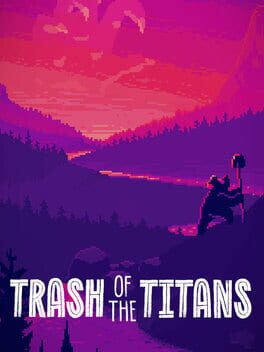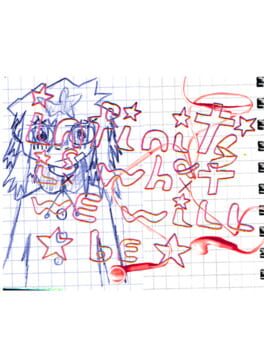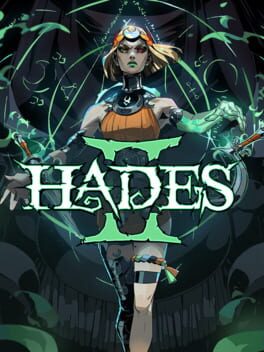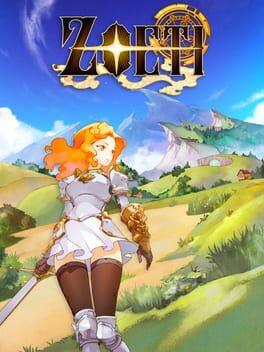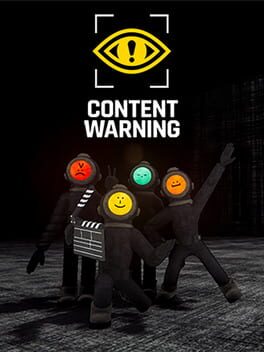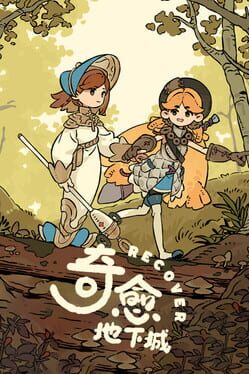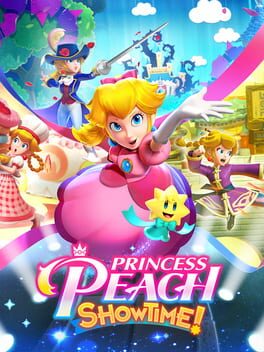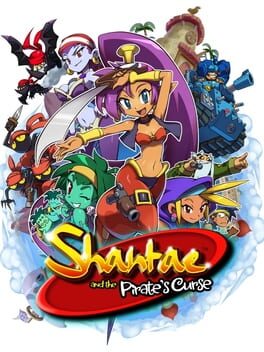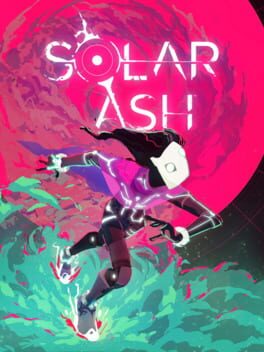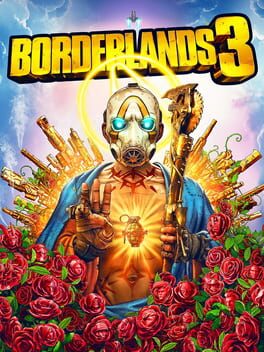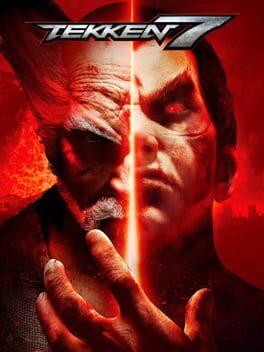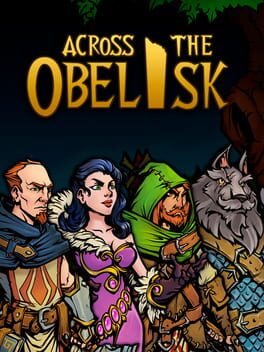bapanadavibes
2024
[Demo review, 3 hours played]
Lovely minimalistic artstyle, satisfying animations and engaging gameplay. The tetris minigame is a fun way of distributing stats. 3 runs deep I already noticed that the RNG aspect for unlocking skills weighs too heavily on the success of the runs. Certain skills feel pretty damn vital, while others rather insignificant or downright useless, making it easy for a run to feel frustrating due to factors outside of your control. However, according to its Steam page, the game's planned to be in Early Access for less than a year, so the balancing will likely get improved upon.
Lovely minimalistic artstyle, satisfying animations and engaging gameplay. The tetris minigame is a fun way of distributing stats. 3 runs deep I already noticed that the RNG aspect for unlocking skills weighs too heavily on the success of the runs. Certain skills feel pretty damn vital, while others rather insignificant or downright useless, making it easy for a run to feel frustrating due to factors outside of your control. However, according to its Steam page, the game's planned to be in Early Access for less than a year, so the balancing will likely get improved upon.
2009
occupies a unique place in the souls universe as the most depressing in atmosphere, and at the same time shortest experience - oddly making it the one most eager to release you from its anguish.
love many great things about it, but for now i'll leave you with how lovely it is to see the maiden in black changing her spot everytime you arrive back at the nexus - chilling on the stairs being my fave. how exciting and mysterious yet ultimately silly the lead-up and eventual fool's idol encounter is (definitely got the boss tune!!!). a throughline of bold and absurd decisions resulting in an idiosyncratic game that i couldn't help but embrace wholeheartedly.
love many great things about it, but for now i'll leave you with how lovely it is to see the maiden in black changing her spot everytime you arrive back at the nexus - chilling on the stairs being my fave. how exciting and mysterious yet ultimately silly the lead-up and eventual fool's idol encounter is (definitely got the boss tune!!!). a throughline of bold and absurd decisions resulting in an idiosyncratic game that i couldn't help but embrace wholeheartedly.
'i don't want this to happen, and yet it will.'
collages of inner life spread across digital pages: raw thoughts, wishes, guilt & regret. dreading the passage of time, circling mistakes made and words we can't take back. on wanting nothing more than to hold onto something//someone, a connection that won't fade with time. an abstract bearing of the soul in hopes of mending wounds -- of the guilt to subside.
inbetween it all, it gives you the space to express yourself - blank pages to be filled. and i think that's because it doesn't want anyone to feel alone with their problems. because it believes it will be okay in the end. beautiful.
// play in browser here
collages of inner life spread across digital pages: raw thoughts, wishes, guilt & regret. dreading the passage of time, circling mistakes made and words we can't take back. on wanting nothing more than to hold onto something//someone, a connection that won't fade with time. an abstract bearing of the soul in hopes of mending wounds -- of the guilt to subside.
inbetween it all, it gives you the space to express yourself - blank pages to be filled. and i think that's because it doesn't want anyone to feel alone with their problems. because it believes it will be okay in the end. beautiful.
// play in browser here
2024
[first impressions, 4.5h playtime~]
Hades 2 welcomes you back into its familiar world, now all a little brighter with a beautiful mix of yellow, blue & green hues. Melinoë's presence is immediately charming, both softspoken, and determined. The world you walk through is one where the past events haunt the walls and weighs heavy on the hearts of its inhabitants characters. It’s a compelling intro - the hub’s witchy aesthetics with its big cauldron and Headmistress Hecate - and all the new prominent female presences - really make it stand apart from its predecessor. Aesthetically and sonically, this was even more my jam than the first.
The biggest combat change was going from multidash to dash + sprinting as the movement tools. Ideally this moves the game away from the dash bonanza the former game was, but the arenas are as tight before, filled with obstacles. This makes sprinting awkward and not a reliable tool outside of more spacious boss arenas. On top of that, they removed the ability to destroy projectiles with attacks (save for when you use the staff), making the projectile-breaking boon for the sprint feel mandatory to avoid chip damage during trash mob rooms. Additionally, they tried to make resource management a bigger question by adding the magick/mana system. These are all good changes on paper, as it makes controlling Melinoë feel distinct from Zagreus, and ideally would allow for more combat approaches to be viable if balanced properly. However, the issues with the combat don't stop there and are compounded by the boon system, which is still largely the same as it was before. This suggests it doesn’t make for very memorable, outlier runs due to how unimpactful and homogenized the choices are, even when stacked. (The addition of magick consumption/regeneration boons does not change that either) The combat encounters outside of miniboss and boss rooms are still groups of trash mobs that spawn in waves - fighting them feels like going through the motions. And when you do reach a boss fight, the damage you can dish out can feel rather laughable - until you’ve got a decent amount of upgrades, and a decent boon set - making for drawn out fights where you’ve already dodging, hitting and waiting to deal with the damage sponge. In the IGN review, it is said that “many roguelites suffer from this feeling of having “doomed runs” where you just don’t get the kind of scaling or key upgrades that you need to survive in later levels, but that was never my experience with Hades 2”. My experience with not only Hades II, but the first one, stands against this. In both games, you will run into encounters that while they might not feel out of your skill level given their attack patterns, will be damage sponges. To alleviate this, you will spend a lot of currency to get you powered up to a level where monsters in the new area will not feel like a chore to kill. Hades II is not the kind of roguelite game where the tools to beat the game are given to you from the get go and the meta-progression mostly unlocks new gameplay elements. A significant part of your power budget is in the meta progression, which a quick glance at the possible unlocks will make clear. Therefore corpse, or rather currency runs, where you’re gonna be aiming to get as much currency as possible to unlock the next thing become more or less naturalized in the gameplay loop. It’s not a game where you can solely focus on engaging with the combat itself to make it deeper into the run. Doomed runs do in fact exist, and I’d argue the game necessitates those as part of its gameplay loop. Currency will always be on your mind, and in Hades II even moreso, as they’ve added extra non-combat interactions which will yield currency: most notably, mining ore and gathering herbs. These are not optional as they are part of meta-progression and do disrupt the combat loop further as now you’re not only killing trash mobs, you’re ever so often doing a menial game of clicks to earn 3 ores. In Hades I, the weapons were merely locked behind boss currency, but here they’ve added more currency bloat and requirements. The herbs and the gardening fill the same niche, though part of it happens in the hub area. I don’t see these as meaningful additions to the game and find they distract from the core aspects of the game. Something the first Hades got right whilst adding fishing, as it did not present a necessary aspect for progression, but a little side activity. If we’re adding minigames to a death run game, why make them take the wind out of your sails?
Now we’ll come to the biggest gripe I had with the predecessor, and that seems to be replicated here from what I can tell: the balance between gameplay and narrative. The first Hades suffered from a combat experience that didn’t measure up in depth to the magnitude of story interactions & plot development - the ones you have to grind to unlock and will be provided to you in fragments. It functions through a sort of dripfeed system where, once you feel you’ve exhausted the options of making a run through the same old dungeon more interesting, you’re still left with a lot of relationships and story you wanna pursue. In my limited time with Hades 2, I’ve already felt an inkling of this as the 4.5h yielded not much in the way of story engagement despite having done a decent number of runs. It becomes the game’s own carrot on a stick, throwing yourself into the pits to gain some currency, a gift or two and hopefully a new story tidbit that feels interesting and meaningful - and not just characters doing a variation on talking about the tropes they’re assigned. In the original Hades I’ve had my fill and put the game down after racking up 50h, which isn’t a shabby number to put on a game, but the main reason I put it down was because I didn’t feel the game rewarded my combat investment through story in a worthwhile manner anymore. It almost becomes the game’s own skinnerbox, where dripfed interactions are the reward for engaging with the combat, as the combat’s fun and merit dissipates due to the low variance of the runs, even if you do try to spice it up and make it more interesting. There’s a fine line between frustrating and doing something for the sake of something else, and the game has crossed those lines too often at that point where the deaths become a means to an end. It makes me beg the question why it was conceived as a roguelite in the first place, as SG’s previous games and the experience with both of these games, make me feel like they could’ve created a very compelling experience that isn’t padded out by currency grind and dripfeeding story as you rack up deaths.
The game doesn’t need me to shower it with praise. I wrote this mainly to formulate my gripes and to share them in an effort to illuminate what I identified as the series’ previous pitfalls and missed potential with this iteration during the few hours I spent with it. I’ll do more runs here and there throughout the year, and reassess it once it’s fully released. I'm not holding my breath for significant changes. As it stands, the road they’re taking for Hades 2 seems to be: more of what was already widely beloved with slight additions/variations.
[*Update after 10h+ playtime*]
- The 3rd area addresses the tight space concerns. its a bigger area and the upgrades are spread throughout it, making the game feel much better as you can really make use of the movement options here.
- However, despite unlocking more things, damage numbers feel low across the board vs. the shield and bullet sponge enemies. It seems to stem from both base damage being rather low and boons not feeling impactful. As it stands, the game's combat and damage don't seem properly balanced, making the game feel like a slog more often than not.
- Sadly, getting further into the game only made the slog that is the currency grind that much more apparent. They've really expanded on the amount of currencies compared to Hades 1.Ssome are area dependent e.g. you can only get this currency in x area with y tool (and you can only pick one tool per run?!). Another big one called F. Fate that is needed for plenty unlocks but you can only get from the exchange broker or certain NPCs when they give you the option during your run. This all exacerbates the issue of currency runs, because you wanna get all this specific currency, but at the same time, you wanna have a good run. It creates this tension between currency and boons that I feel is contradictory to making the game feel rewarding to play, because you're either gonna make yourself stronger during your run, or you'll get currency you need - and this choice shouldn't need to exist in a game that is this grindy in the first place. Having good runs should translate into getting plenty resources you need. This deviation screams bloat through currencies and doesn't make the game feel rewarding to play.
TL;DR game has currency/grind bloat and the damage numbers seem off. Lots of bullet sponge/shield enemies - combat (and boons) don't feel satisfying, rewarding nor interestingly challenging
My recommendation: play Hades 1, wait for this game to get balanced
Hades 2 welcomes you back into its familiar world, now all a little brighter with a beautiful mix of yellow, blue & green hues. Melinoë's presence is immediately charming, both softspoken, and determined. The world you walk through is one where the past events haunt the walls and weighs heavy on the hearts of its inhabitants characters. It’s a compelling intro - the hub’s witchy aesthetics with its big cauldron and Headmistress Hecate - and all the new prominent female presences - really make it stand apart from its predecessor. Aesthetically and sonically, this was even more my jam than the first.
The biggest combat change was going from multidash to dash + sprinting as the movement tools. Ideally this moves the game away from the dash bonanza the former game was, but the arenas are as tight before, filled with obstacles. This makes sprinting awkward and not a reliable tool outside of more spacious boss arenas. On top of that, they removed the ability to destroy projectiles with attacks (save for when you use the staff), making the projectile-breaking boon for the sprint feel mandatory to avoid chip damage during trash mob rooms. Additionally, they tried to make resource management a bigger question by adding the magick/mana system. These are all good changes on paper, as it makes controlling Melinoë feel distinct from Zagreus, and ideally would allow for more combat approaches to be viable if balanced properly. However, the issues with the combat don't stop there and are compounded by the boon system, which is still largely the same as it was before. This suggests it doesn’t make for very memorable, outlier runs due to how unimpactful and homogenized the choices are, even when stacked. (The addition of magick consumption/regeneration boons does not change that either) The combat encounters outside of miniboss and boss rooms are still groups of trash mobs that spawn in waves - fighting them feels like going through the motions. And when you do reach a boss fight, the damage you can dish out can feel rather laughable - until you’ve got a decent amount of upgrades, and a decent boon set - making for drawn out fights where you’ve already dodging, hitting and waiting to deal with the damage sponge. In the IGN review, it is said that “many roguelites suffer from this feeling of having “doomed runs” where you just don’t get the kind of scaling or key upgrades that you need to survive in later levels, but that was never my experience with Hades 2”. My experience with not only Hades II, but the first one, stands against this. In both games, you will run into encounters that while they might not feel out of your skill level given their attack patterns, will be damage sponges. To alleviate this, you will spend a lot of currency to get you powered up to a level where monsters in the new area will not feel like a chore to kill. Hades II is not the kind of roguelite game where the tools to beat the game are given to you from the get go and the meta-progression mostly unlocks new gameplay elements. A significant part of your power budget is in the meta progression, which a quick glance at the possible unlocks will make clear. Therefore corpse, or rather currency runs, where you’re gonna be aiming to get as much currency as possible to unlock the next thing become more or less naturalized in the gameplay loop. It’s not a game where you can solely focus on engaging with the combat itself to make it deeper into the run. Doomed runs do in fact exist, and I’d argue the game necessitates those as part of its gameplay loop. Currency will always be on your mind, and in Hades II even moreso, as they’ve added extra non-combat interactions which will yield currency: most notably, mining ore and gathering herbs. These are not optional as they are part of meta-progression and do disrupt the combat loop further as now you’re not only killing trash mobs, you’re ever so often doing a menial game of clicks to earn 3 ores. In Hades I, the weapons were merely locked behind boss currency, but here they’ve added more currency bloat and requirements. The herbs and the gardening fill the same niche, though part of it happens in the hub area. I don’t see these as meaningful additions to the game and find they distract from the core aspects of the game. Something the first Hades got right whilst adding fishing, as it did not present a necessary aspect for progression, but a little side activity. If we’re adding minigames to a death run game, why make them take the wind out of your sails?
Now we’ll come to the biggest gripe I had with the predecessor, and that seems to be replicated here from what I can tell: the balance between gameplay and narrative. The first Hades suffered from a combat experience that didn’t measure up in depth to the magnitude of story interactions & plot development - the ones you have to grind to unlock and will be provided to you in fragments. It functions through a sort of dripfeed system where, once you feel you’ve exhausted the options of making a run through the same old dungeon more interesting, you’re still left with a lot of relationships and story you wanna pursue. In my limited time with Hades 2, I’ve already felt an inkling of this as the 4.5h yielded not much in the way of story engagement despite having done a decent number of runs. It becomes the game’s own carrot on a stick, throwing yourself into the pits to gain some currency, a gift or two and hopefully a new story tidbit that feels interesting and meaningful - and not just characters doing a variation on talking about the tropes they’re assigned. In the original Hades I’ve had my fill and put the game down after racking up 50h, which isn’t a shabby number to put on a game, but the main reason I put it down was because I didn’t feel the game rewarded my combat investment through story in a worthwhile manner anymore. It almost becomes the game’s own skinnerbox, where dripfed interactions are the reward for engaging with the combat, as the combat’s fun and merit dissipates due to the low variance of the runs, even if you do try to spice it up and make it more interesting. There’s a fine line between frustrating and doing something for the sake of something else, and the game has crossed those lines too often at that point where the deaths become a means to an end. It makes me beg the question why it was conceived as a roguelite in the first place, as SG’s previous games and the experience with both of these games, make me feel like they could’ve created a very compelling experience that isn’t padded out by currency grind and dripfeeding story as you rack up deaths.
The game doesn’t need me to shower it with praise. I wrote this mainly to formulate my gripes and to share them in an effort to illuminate what I identified as the series’ previous pitfalls and missed potential with this iteration during the few hours I spent with it. I’ll do more runs here and there throughout the year, and reassess it once it’s fully released. I'm not holding my breath for significant changes. As it stands, the road they’re taking for Hades 2 seems to be: more of what was already widely beloved with slight additions/variations.
[*Update after 10h+ playtime*]
- The 3rd area addresses the tight space concerns. its a bigger area and the upgrades are spread throughout it, making the game feel much better as you can really make use of the movement options here.
- However, despite unlocking more things, damage numbers feel low across the board vs. the shield and bullet sponge enemies. It seems to stem from both base damage being rather low and boons not feeling impactful. As it stands, the game's combat and damage don't seem properly balanced, making the game feel like a slog more often than not.
- Sadly, getting further into the game only made the slog that is the currency grind that much more apparent. They've really expanded on the amount of currencies compared to Hades 1.Ssome are area dependent e.g. you can only get this currency in x area with y tool (and you can only pick one tool per run?!). Another big one called F. Fate that is needed for plenty unlocks but you can only get from the exchange broker or certain NPCs when they give you the option during your run. This all exacerbates the issue of currency runs, because you wanna get all this specific currency, but at the same time, you wanna have a good run. It creates this tension between currency and boons that I feel is contradictory to making the game feel rewarding to play, because you're either gonna make yourself stronger during your run, or you'll get currency you need - and this choice shouldn't need to exist in a game that is this grindy in the first place. Having good runs should translate into getting plenty resources you need. This deviation screams bloat through currencies and doesn't make the game feel rewarding to play.
TL;DR game has currency/grind bloat and the damage numbers seem off. Lots of bullet sponge/shield enemies - combat (and boons) don't feel satisfying, rewarding nor interestingly challenging
My recommendation: play Hades 1, wait for this game to get balanced
2023
Zoeti is a card-based RPG where you play as one of three classes. It sets itself apart from contemporaries by having the player go through story missions with a fixed set of cards as you play by the rules of Poker. Here you collect skill cards which you can assign to each Poker move (one pair, two pair, flush etc.) and activate the skills in combat by using the required cards for each move. As you go through the missions, you accumulate resources for upgrading your skill cards, character, buy passive and active items. One would be off-base to equate it to StS because in Zoeti you’re not building a deck per se. You’re amassing power through resources, choose what skill cards you wanna upgrade and what move slots to put them in, and decide what moves you wanna dish out with any given hand. The game's combat suggests an intriguing depth as you have to make decisions between the different moves with a Poker rulesets meeting turn-based card RPG mechanics - a pretty novel approach away from the mana-based combat we’ve seen countless iterations on. The story aspect is conveyed through a visual novels with a light-hearted atmosphere, tongue-in-cheek humour and well-drawn characters and pleasant backgrounds. The writing itself is serviceable, though it doesn’t seem very interesting in the early game missions.
Despite all this, I’ve had a rather frustrating time with Zoeti. And I think the reason why the game doesn’t feel compelling enough despite its interesting combat system and neat art presentation, is how it feels to navigate the game. The UI frankly leaves a lot to be desired when it comes to status effects, items, combat - really, conveying easily or at a glance both what’s at your disposal and what’s going on. Having to scroll through status effects box being required to find out about status effects on a unit is definitely the most awkward aspect as it makes the combat tedious and unappealing. Now I’m not saying the likes of StS have great UI design, but the fact that they allow you to hover a status icon and see what it does makes it intuitive for the player and allows them to learn each effect as they play.
The scroll issue goes for the items, too. You amass a pretty decent chunk of items as they’re one of the main ways of enhancing your character and having to scroll through them Now you can avoid that by going into the Prepare menu and see them more easily, but that means 2 clicks (1 screen transition). A workaround here would be if the Accessory icon next to the items would you straight to that menu point. Same for the item and card overview. It would also help if things were more clearly popping out to the player by either glowing on mark-up, or sticking out more in another as every icon has the same color palette. The Prepare icon being small and at the top right of the screen doesn’t lend itself to easy access as it is.
Now about combat. Unit selection is a separate process from using your combos which isn’t necessarily bad, but the target icon isn’t very visible (again, a lot of the game is very white/beige). Making combos by selecting cards is a click on/off process unless you wanna use the preselected combo offered by the game. It’s not issue on keyboard+mouse, but with a controller it can be a real pain. I think the fact that selecting a move only shows one possible way to use up your hand makes it finicker than it needs to be. Being able to cycle through different ways of using your hand with each combo could be a bandaid. Really, these are minor issues on top of the combat being messy because of how previously mentioned issues with UI and status effects are only exacerbated on controller and make playing the game an even more tedious affair. Definitely a game I’d recommend only playing with keyboard+mouse in its current state.
When the game does save and when you're good to close the game isn't quite clear either, as there's no save icon conveying this information, nor a save button you can use. It seems to save after every map completion. This uncertainty makes the game unsuited for short game sessions and is something that should really be clearly communicated to the player.
All in all, don’t get me wrong, it’s a promising game with a good foundation and novel spin. At the same time, it is frustrating because I can see its potential, which is why I took the time to outline why I think it didn’t manage to win me over, and where it could be improved on the technical side. As it stands, I can’t give it a recommendation.
Despite all this, I’ve had a rather frustrating time with Zoeti. And I think the reason why the game doesn’t feel compelling enough despite its interesting combat system and neat art presentation, is how it feels to navigate the game. The UI frankly leaves a lot to be desired when it comes to status effects, items, combat - really, conveying easily or at a glance both what’s at your disposal and what’s going on. Having to scroll through status effects box being required to find out about status effects on a unit is definitely the most awkward aspect as it makes the combat tedious and unappealing. Now I’m not saying the likes of StS have great UI design, but the fact that they allow you to hover a status icon and see what it does makes it intuitive for the player and allows them to learn each effect as they play.
The scroll issue goes for the items, too. You amass a pretty decent chunk of items as they’re one of the main ways of enhancing your character and having to scroll through them Now you can avoid that by going into the Prepare menu and see them more easily, but that means 2 clicks (1 screen transition). A workaround here would be if the Accessory icon next to the items would you straight to that menu point. Same for the item and card overview. It would also help if things were more clearly popping out to the player by either glowing on mark-up, or sticking out more in another as every icon has the same color palette. The Prepare icon being small and at the top right of the screen doesn’t lend itself to easy access as it is.
Now about combat. Unit selection is a separate process from using your combos which isn’t necessarily bad, but the target icon isn’t very visible (again, a lot of the game is very white/beige). Making combos by selecting cards is a click on/off process unless you wanna use the preselected combo offered by the game. It’s not issue on keyboard+mouse, but with a controller it can be a real pain. I think the fact that selecting a move only shows one possible way to use up your hand makes it finicker than it needs to be. Being able to cycle through different ways of using your hand with each combo could be a bandaid. Really, these are minor issues on top of the combat being messy because of how previously mentioned issues with UI and status effects are only exacerbated on controller and make playing the game an even more tedious affair. Definitely a game I’d recommend only playing with keyboard+mouse in its current state.
When the game does save and when you're good to close the game isn't quite clear either, as there's no save icon conveying this information, nor a save button you can use. It seems to save after every map completion. This uncertainty makes the game unsuited for short game sessions and is something that should really be clearly communicated to the player.
All in all, don’t get me wrong, it’s a promising game with a good foundation and novel spin. At the same time, it is frustrating because I can see its potential, which is why I took the time to outline why I think it didn’t manage to win me over, and where it could be improved on the technical side. As it stands, I can’t give it a recommendation.
2024
2024
warning: loud high-pitched noise first thing after you press start
cute bite-sized dungeon crawler whose story changes depending on your choices. made for repeat playthroughs as the first run where you're figuring out how to solve the combat encounters should take 30-40min max.
appreciate the yuri energy, would enjoy more in the same vein <3
cute bite-sized dungeon crawler whose story changes depending on your choices. made for repeat playthroughs as the first run where you're figuring out how to solve the combat encounters should take 30-40min max.
appreciate the yuri energy, would enjoy more in the same vein <3
off to a rough start when it hits you with sexualized female characters of unclear age, a sluggish first level and an uninteresting peek into a world steeped in orientalism reminiscent of aladdin. its reputation as 'the game to play in the series' and metroidvania label nonetheless made me truck onwards to see if there isn't something compelling to be found behind its offputting presentation.
the second world already felt a bit better, though the combat still remained rough as the enemies mostly serve as obstacles who you begrudgingly whip your hair back and forth against just so you don't run into the risk of body collision and knockback. meanwhile, the bosses were a welcome sight as they offered a little engagement through their mechanics and didn't overstay their welcome.
the game is certainly not helped by how unengaging the overarching story is, which results in issues with unlocking key items necessary for progression as they’re tied to talking to npcs. one could make it a habit to talk to everyone in town whenever you’re there and figure it out that way, but it doesn’t change it behind a drag. revisiting former levels with new abilities is a no brainer for anyone familiar with these types of games and works here, too, and i wish was the main way of unlocking & making progress.
all that said, once you do unlock the first movement ability is the point where the game finally shows real promise as it allows you to engage with the levels’ platforming and enemies more, making for satisfying dynamic moments. this of course doesn’t come as a surprise with games where unlocking abilities is one of the main draws, but here it really revealed how sluggish and unrefined the game was prior, and how much the game shifts going forward.. the games i have the most fondness don’t have exploration and existence in its world feel a like a chore without the upcoming abilities; instead moving around in them already feels interesting without anything fancy. they make you want to push forward to obtain those powers.
from this point onwards the game only got better for the most part as the levels became more intricate and new abilities were obtained – shoutout to the scimitar downsmash and rush ability!! the few puzzle served a medium amount of challenge that didn’t halt progress for too long but still felt like an obstacle. the currency dropped from monsters remained worthwhile throughout as it is used to buy certain upgrades and resources useful until the very end. (still wish a magnet ability existed as you could easily lose gems dropping from a vase etc.) secrets and collectables were spread out so you came across them frequently enough for it to feel rewarding (though having to go to an npc in town to upgrade 4 heart containers into 1 was a tad annoying).
at this point, my main gripe left was the save npc, which was often enough placed so that you’d either have to backtrack for it or in one instance - completely absurdly. there’s 1 (!) stealth section in the game where whenever you’re caught, you have to do approx. 5+ rooms again. it wasn’t even challenging, but it would trip you up often enough to warrant a few resets where you’re left waiting for guards to turn the other way again you had already figured out. one could say the game was taking the piss here!
the last big challenge where you (spoiler) have to climb a tower through the most difficult platforming gauntlets was definitely the highlight of the game. it takes all you’ve had to deal with throughout the game and ups the ante. with no save point throughout, mind you (though you can always use healing items to keep going as long as you have resources for) with all movement abilities at your disposal, this was a greatly satisfying challenge. it wrapped up the experience neatly with a satisfying boss battle.
all in all, shantae ultimately managed to win me over in the second half. it’s a careful recommendation with a lot of caveats, but if you happen to own it, or wanna see what shantae is all about, you might as well go for this one.
the second world already felt a bit better, though the combat still remained rough as the enemies mostly serve as obstacles who you begrudgingly whip your hair back and forth against just so you don't run into the risk of body collision and knockback. meanwhile, the bosses were a welcome sight as they offered a little engagement through their mechanics and didn't overstay their welcome.
the game is certainly not helped by how unengaging the overarching story is, which results in issues with unlocking key items necessary for progression as they’re tied to talking to npcs. one could make it a habit to talk to everyone in town whenever you’re there and figure it out that way, but it doesn’t change it behind a drag. revisiting former levels with new abilities is a no brainer for anyone familiar with these types of games and works here, too, and i wish was the main way of unlocking & making progress.
all that said, once you do unlock the first movement ability is the point where the game finally shows real promise as it allows you to engage with the levels’ platforming and enemies more, making for satisfying dynamic moments. this of course doesn’t come as a surprise with games where unlocking abilities is one of the main draws, but here it really revealed how sluggish and unrefined the game was prior, and how much the game shifts going forward.. the games i have the most fondness don’t have exploration and existence in its world feel a like a chore without the upcoming abilities; instead moving around in them already feels interesting without anything fancy. they make you want to push forward to obtain those powers.
from this point onwards the game only got better for the most part as the levels became more intricate and new abilities were obtained – shoutout to the scimitar downsmash and rush ability!! the few puzzle served a medium amount of challenge that didn’t halt progress for too long but still felt like an obstacle. the currency dropped from monsters remained worthwhile throughout as it is used to buy certain upgrades and resources useful until the very end. (still wish a magnet ability existed as you could easily lose gems dropping from a vase etc.) secrets and collectables were spread out so you came across them frequently enough for it to feel rewarding (though having to go to an npc in town to upgrade 4 heart containers into 1 was a tad annoying).
at this point, my main gripe left was the save npc, which was often enough placed so that you’d either have to backtrack for it or in one instance - completely absurdly. there’s 1 (!) stealth section in the game where whenever you’re caught, you have to do approx. 5+ rooms again. it wasn’t even challenging, but it would trip you up often enough to warrant a few resets where you’re left waiting for guards to turn the other way again you had already figured out. one could say the game was taking the piss here!
the last big challenge where you (spoiler) have to climb a tower through the most difficult platforming gauntlets was definitely the highlight of the game. it takes all you’ve had to deal with throughout the game and ups the ante. with no save point throughout, mind you (though you can always use healing items to keep going as long as you have resources for) with all movement abilities at your disposal, this was a greatly satisfying challenge. it wrapped up the experience neatly with a satisfying boss battle.
all in all, shantae ultimately managed to win me over in the second half. it’s a careful recommendation with a lot of caveats, but if you happen to own it, or wanna see what shantae is all about, you might as well go for this one.
2021
throws you into a promising, beautiful world with a mysterious atmosphere... but the initial interest wears off quick as you realize how haphazardly a lot of elements are thrown together: pick-ups that only serve a shield-refreshing purpose in a game where death is swift but inconsequential. platforming challenges that fluctuate between very simple to difficulty through jankiness. arduous narrative exposition. -- all a bit of a letdown coming from the people who made something as uncompromising and self-assured as hyper light drifter.
2019
a carbon copy of bl2 with a pretend-fresh coat of paint. the same old remains: obtrusive narration with obnoxious writing, OK combat bogged down by a tired, uninvolving loot system - packaged within an open world that feels empty and lifeless. everything seems predetermined; there's nothing exciting at the end of these long roads.
2019
NO OPTION TO TURN OFF FLASHING/STROBE LIGHTS
Played fine for 5h until I got to a segment with intense strobe/flashing lights (part of an encounter/puzzle).
Tried to find an option to turn it off but there is NONE. And from what I've read, there are more intense strobe/flashing lights parts down the line, especially in the DLC.
One would hope a game released in 2019 had this kind of accessibility option...
Played fine for 5h until I got to a segment with intense strobe/flashing lights (part of an encounter/puzzle).
Tried to find an option to turn it off but there is NONE. And from what I've read, there are more intense strobe/flashing lights parts down the line, especially in the DLC.
One would hope a game released in 2019 had this kind of accessibility option...
lighthearted & breezy platformer romp through six different worlds. the new elephant power is good fun, but the absolute highlight is how often the game offers beautifully animated divergences with new ways to overcome obstacles - sometimes in complete transformation of the level you're in - keeping it fresh and engaging. all wrapped up in wonderfully expressive presentation with a lovely soundtrack. (played through it all as daisy, of course!)
2015
2021
A game about doing countless runs grinding for miniscule (+1 block/attack/etc.) upgrades in a game with terrible class and combat balance based around (de)buffs where normal encounters will suddenly outstat you from one combat to the next. The kind of game where it feels like the roguelite aspect is solely there to absurdly increase the amount of time it takes you to get anywhere in the game by slowly stacking mainly uninteresting, flat bonuses and getting town upgrades... instead of being an aspect used to make your future runs and tools varied. Disappointing, to say the least.
